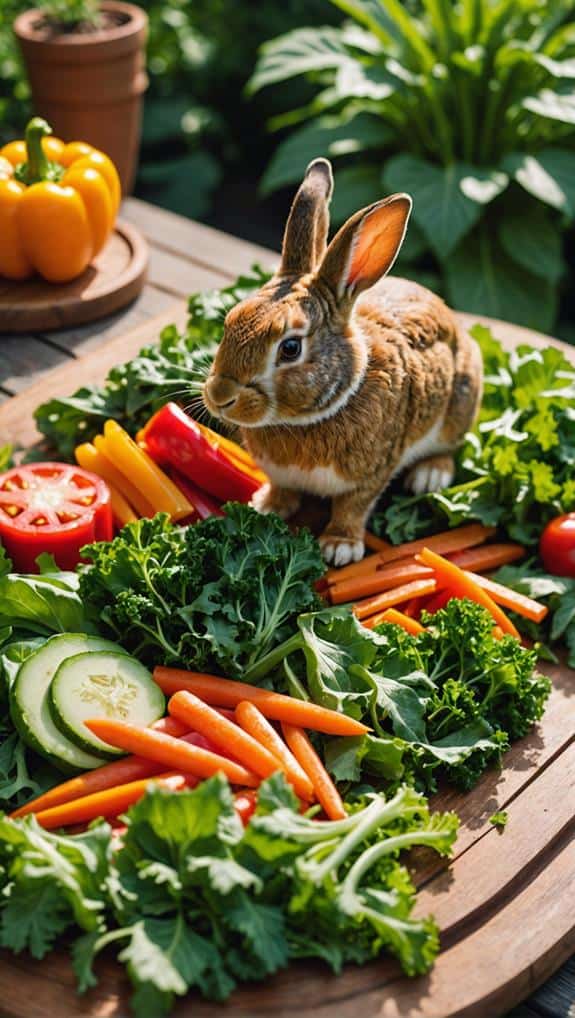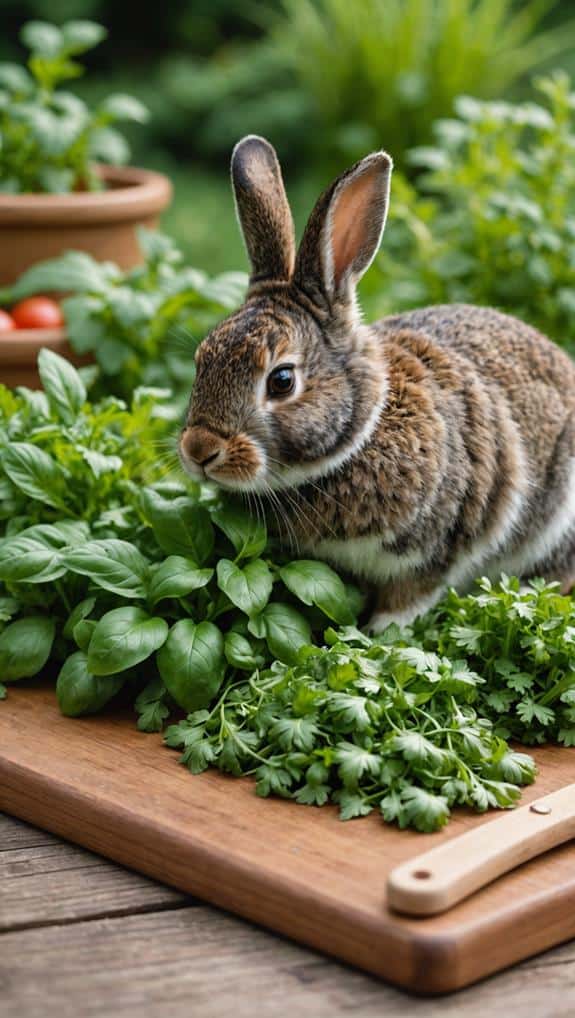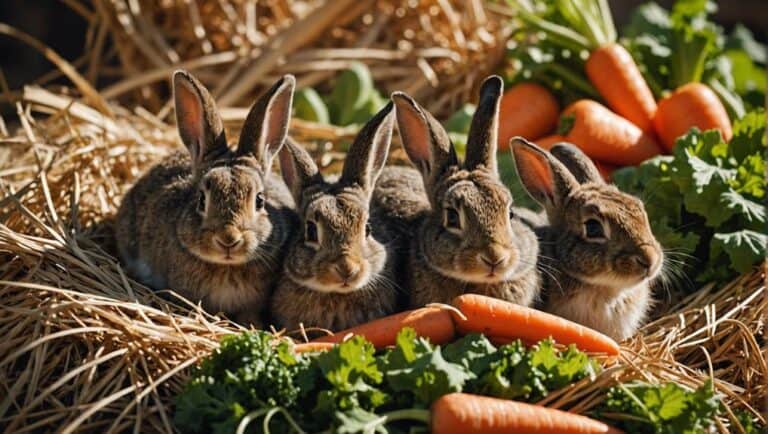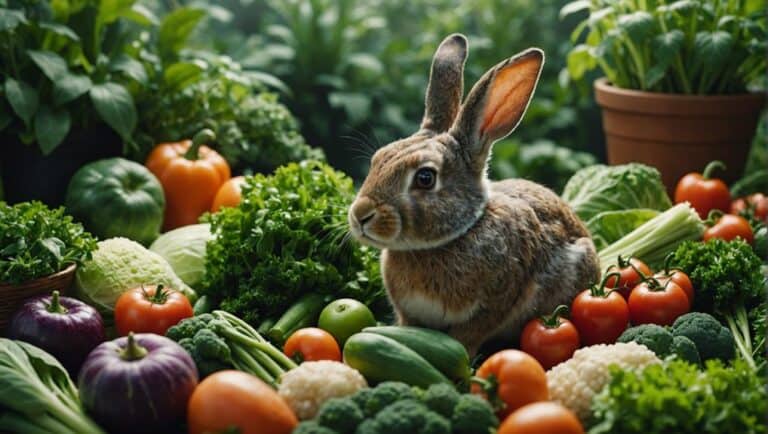When it comes to helping your overweight rabbit shed those extra pounds, choosing the right snacks is essential. You want to focus on low-calorie, high-fiber options that not only satisfy their cravings but also support their overall health. Fresh leafy greens and certain herbs can be effective choices, but it's important to know which ones are best. As you consider these options, think about how portion control and creativity can play a role in your rabbit's weight management journey. So, what should you include in their snack rotation to guarantee they stay healthy and happy?
Contents
Importance of Low-Calorie Treats

When it comes to your rabbit's health, the importance of low-calorie treats can't be overstated. For overweight rabbits, these treats provide an effective way to reward and engage them without adding unnecessary calories that could impede their weight loss. Low-calorie treats, particularly those that are high-fiber, such as fresh leafy greens like romaine lettuce and cilantro, help maintain satiety while supporting digestive health.
Additionally, incorporating a high-fiber diet is vital for guaranteeing your rabbit's overall wellness and digestive function.
Incorporating snacks like small pieces of bell pepper or cucumber can facilitate healthy snacking habits, allowing your rabbit to enjoy satisfying options without contributing to weight gain. These choices not only promote better weight management but also encourage foraging behaviors. This intrinsic activity allows rabbits to experience natural exercise, enhancing their overall well-being.
It's essential, however, to limit the portion sizes of these low-calorie snacks. They should only account for a minor fraction of your rabbit's overall diet, which must primarily consist of hay.
High-Fiber Vegetable Options
When selecting high-fiber vegetables for your overweight rabbit, focus on nutrient-dense options like kale, romaine lettuce, and parsley.
Incorporating a variety of vegetables not only adds essential nutrients but also promotes optimal nutrition balancing hay for your rabbit's overall diet.
It's vital to maintain portion control, as even healthy snacks can contribute to excess calorie intake if overfed.
Nutrient-Dense Vegetable Choices
For overweight rabbits, incorporating high-fiber vegetables into their diet is crucial for promoting digestive health and aiding in weight management. A balanced diet that includes these vegetables can also enhance their overall well-being and prevent common health issues like obesity and GI stasis, which are particularly concerning for rabbits.
By selecting nutrient-dense vegetables, you can guarantee your rabbit receives the necessary vitamins and minerals while maintaining a low calorie density. Here are three excellent options to take into account:
- Leafy greens: Kale, romaine lettuce, and Swiss chard provide essential nutrients and are high in fiber.
- Cruciferous vegetables: Broccoli and cauliflower leaves are low in calories but high in fiber, keeping your rabbit satisfied without excess weight gain.
- Hydrating options: Bell peppers and cucumbers offer hydration and nutrients with minimal sugars.
These high-fiber choices not only keep your rabbit fuller for longer but also support their natural foraging instincts.
It's important to limit starchy vegetables like carrots, as their higher sugar content can hinder weight loss efforts. Additionally, guaranteeing that your rabbit has unlimited access to high-quality hay, as recommended for their health, will further aid in weight management by promoting a balanced diet.
Introducing a diverse array of safe vegetables in moderation can prevent dietary boredom, guaranteeing that your rabbit enjoys a well-rounded and healthy diet. By focusing on these nutrient-dense vegetable choices, you can help your furry friend shed pounds while promoting overall health.
Portion Control Importance
Maintaining portion control is a key factor in managing your rabbit's weight effectively, especially when incorporating high-fiber vegetable options into their diet. For ideal weight loss, you should limit vegetable servings to 1 cup per 2 pounds of body weight. This helps guarantee your rabbit receives a balanced intake of nutrients without excess calories.
It's crucial to remember that while carrots are often seen as a favorite treat, they should be offered in moderation due to their high sugar content, as excessive carrot consumption can lead to obesity and digestive disorders carrots as occasional treats.
Prioritizing high-fiber vegetables like leafy greens—romaine lettuce, kale, and parsley—offers a healthy snack option that's low in calories and rich in important nutrients. When introducing new vegetables, do so gradually, ideally one at a time, to monitor for any adverse reactions while still adhering to portion sizes. This helps avoid gastrointestinal issues that can arise from sudden changes in diet.
Opt for vegetables low in sugar, such as bell peppers, celery, and cucumber, to further reduce caloric intake while providing a satisfying crunch. Offering a variety of these high-fiber vegetables not only aids in portion control but also supports your rabbit's overall digestive health, contributing notably to their weight loss efforts.
Safe Herbs for Rabbits

Incorporating safe herbs into your rabbit's diet can provide essential nutrients and enhance flavor without adding excessive calories.
Herbs like basil, parsley, dill, and cilantro not only promote hydration but also offer beneficial antioxidants.
To guarantee your rabbit tolerates new herbs well, introduce them gradually and stick to the recommended serving size.
Nutritional Benefits of Herbs
Exploring the nutritional benefits of herbs can greatly enhance the diet of overweight rabbits. Incorporating safe herbs into their meals not only contributes to weight management but also boosts their overall health. Here are some key points to regard:
- Fresh herbs are low in calories, making them a good source of satisfying snacks.
- High fiber content aids in promoting a healthy digestive system.
- Packed with vitamins and minerals, herbs support immune function.
Herbs like basil, cilantro, parsley, and dill are excellent choices. They provide essential nutrients that can improve your rabbit's well-being while enticing them to forage, promoting physical activity and mental stimulation.
The antioxidants found in these herbs can further enhance their health, offering benefits like improved immunity.
When introducing herbs into your rabbit's diet, do so gradually. Start with small amounts, allowing your pet to adjust while monitoring for any adverse reactions. This careful approach guarantees that your rabbit can enjoy the many health benefits these herbs offer without compromising their digestive system.
Recommended Safe Herbs
Finding safe herbs for your rabbit can enhance their diet and support weight management. Incorporating herbs like parsley, cilantro, and basil into your rabbit's meals offers a nutritious, low-calorie option that's perfect for a healthy rabbit. These herbs are rich in essential vitamins and minerals, guaranteeing your furry friend gets the nutrients they need while shedding pounds.
Mint varieties, such as spearmint and peppermint, are also excellent choices. They provide a rejuvenating flavor and can be given in moderation as safe snacks.
Dandelion greens stand out for their high nutrient content and are a delicious way to contribute to weight loss without sacrificing taste.
Consider introducing thyme, oregano, and dill gradually. These herbs are low in calories and can stimulate your rabbit's foraging behavior, enriching their environment and keeping them engaged.
Always remember to wash herbs thoroughly and verify they're free from pesticides or chemicals before offering them to your rabbit. By selecting these safe herbs, you'll provide your pet with healthy snacks that promote weight management and overall well-being.
Limited Fruit Treats
How often should you treat your overweight rabbit to fruit? It's essential to limit these sugary snacks to just 1-2 times a week. Excessive sugar can lead to weight gain and health issues, so moderation is key. Remember, fruit should only make up about 10% of your rabbit's total diet.
Here are some guidelines for introducing fruit treats:
- Offer small portions of healthy fruits like apples or berries.
- Gradually introduce new fruit to monitor for any digestive issues.
- Avoid dried fruits or those with added sugars, which can contribute to obesity.
Instead of making fruit a staple, prioritize fibrous vegetables and provide unlimited access to hay. These options support a healthy rabbit diet while guaranteeing your pet receives the necessary nutrients without excess calories.
When you do indulge your rabbit with a fruit treat, keep it minimal and ascertain it's a healthy choice. This approach helps maintain your rabbit's weight, encourages a balanced diet, and promotes overall well-being.
Creative Foraging Ideas

While limiting fruit treats is important for managing your overweight rabbit's diet, incorporating creative foraging ideas can enhance their overall well-being and encourage natural behaviors. To stimulate your rabbit's interest and activity, scatter small portions of healthy snacks, like high-fiber vegetables and a few pellets, within piles of hay. This not only promotes foraging but also encourages physical exercise.
You can create forage trays filled with shredded cardboard or grass hay, hiding fresh herbs or veggies inside. This promotes exploration and keeps your rabbit mentally engaged.
Alternatively, use shallow, untreated wooden boxes filled with hay and small bits of vegetables or timothy hay cubes, allowing your rabbit to dig and sift through materials for their snacks.
Cardboard tubes filled with hay, with hidden treats at the ends, provide a fun challenge that taps into your rabbit's natural chewing instincts.
Portion Control for Snacks
Maintaining portion control for snacks is essential in managing your overweight rabbit's diet effectively. By being mindful of what and how much you serve, you can help your furry friend shed pounds while still enjoying occasional treats.
- Limit snacks to no more than 10% of your rabbit's daily caloric intake.
- Offer small portions of low-calorie, high-fiber treats like fresh herbs or leafy greens.
- Monitor the total amount of snacks given to prevent unwanted weight gain.
To achieve effective portion control for snacks, incorporate low-calorie, high-fiber rabbit food such as parsley or cilantro, ensuring they stay interested without consuming excess calories.
Monitor your rabbit's daily caloric intake closely, limiting treats to only a few ounces of fresh vegetables or a tablespoon of snacks. Gradually introduce new snacks in small portions to avoid disrupting their dietary balance.
Additionally, incorporate snack time into foraging activities by scattering treats within their hay, promoting natural scavenging behavior. This not only makes mealtime fun but also helps maintain their health and weight.
Avoiding Sugary Snacks

Sugar can be a hidden enemy in your rabbit's diet, especially for those struggling with weight. For overweight rabbits, it's essential to avoid sugary snacks like dried fruits, sweetened pellets, and high-calorie vegetables.
These treats can lead to significant weight gain and various health issues, including dental problems and gastrointestinal stasis.
A healthy diet for your rabbit should prioritize high-fiber pellets, ideally made from timothy hay, limited to 35g per kg of body weight per day. This helps maintain proper digestive health while promoting weight loss.
When introducing fresh vegetables, do so gradually, focusing on low-starch options like leafy greens. Avoid calorie-dense vegetables, as they can easily derail your rabbit's weight management efforts.
Monitoring Rabbit Weight
How can you effectively monitor your rabbit's weight to guarantee a healthy lifestyle? Proper weight management is essential for your rabbit's overall health, and you can achieve this by consistently monitoring weight. Here are three important steps to guide you:
- Weigh your rabbit weekly to track weight loss or maintenance.
- Use a pet-specific scale for accurate measurements.
- Schedule regular veterinary check-ups for professional guidance.
To begin, weigh your rabbit weekly to effectively track progress and observe any changes in behavior or activity levels.
It's important to utilize a scale specifically designed for pets to assure accuracy.
Additionally, keep a detailed record of your rabbit's weight history, noting any dietary adjustments and exercise changes, which will help you identify patterns that may require attention.
Consult with your veterinarian to establish a healthy weight goal tailored to your rabbit’s breed and individual condition. It’s essential to monitor your rabbit’s progress towards this weight goal regularly. Ensuring they receive optimal nutrition for dwarf rabbits is crucial, as their dietary needs differ from those of larger breeds. A balanced diet, rich in hay, fresh vegetables, and specially formulated pellets, will help support their health and prevent obesity-related issues.
Regular veterinary check-ups not only assess your rabbit's health but also allow for necessary dietary adjustments based on professional recommendations.
Engaging Exercise Activities

To promote a healthy lifestyle for your rabbit, incorporating engaging exercise activities is essential. Rabbits are naturally active creatures that need ample space to run and play. To meet your rabbit's needs, aim for at least three hours of exercise daily. Scattering a small portion of healthy snacks, like pellets, within hay encourages your rabbit to engage in exercise while foraging, making meals both fun and active.
Creating digging areas in shallow planters filled with soil allows your rabbit to enjoy aerobic workouts, which enhance cardiovascular health. Additionally, providing rabbit-safe toys and tunnels stimulates exploration, helping your rabbit expend energy and stay fit.
Foraging trays with hidden treats can also keep your rabbit mentally engaged, prompting movement as they search for their food. Encourage your rabbit to explore different environments, ensuring they've access to fresh air and new sights.
Regular playtime outside of their cage in a secure setting will greatly contribute to their overall well-being. By integrating these activities into their routine, you can help your rabbit maintain a healthy weight while promoting a more enjoyable lifestyle.
Final Thoughts
Incorporating healthy snacks into your overweight rabbit's diet can be a delightful journey towards better health. By focusing on low-calorie, high-fiber options, you're not just helping them shed a few pounds; you're also enriching their lives. Remember to balance treats with portion control and make exercise a fun part of their routine. With a little care and creativity, you'll both enjoy the sweet rewards of a healthier, happier bunny.






